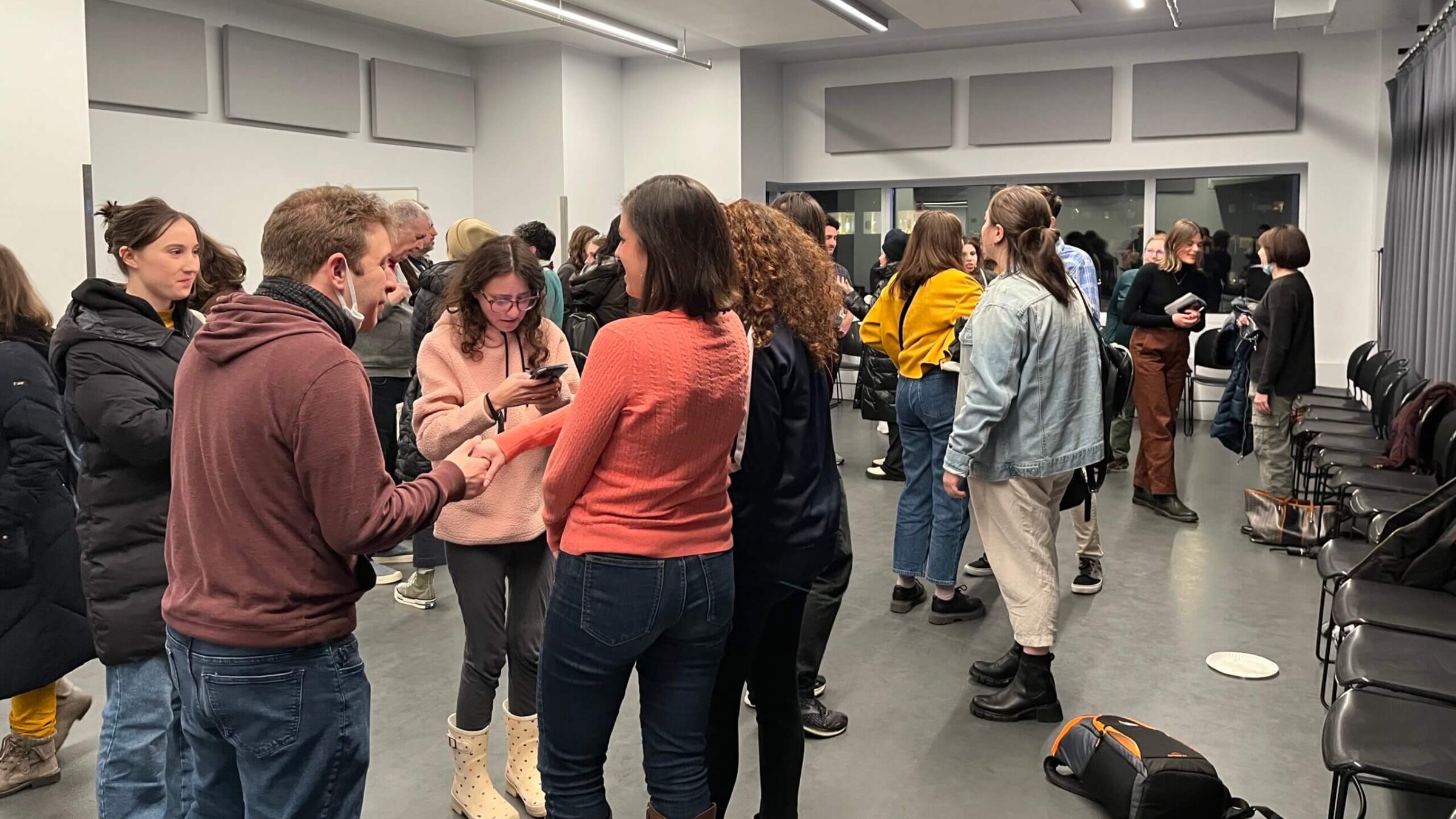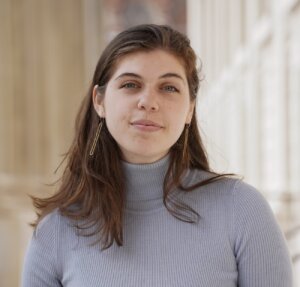After neo-Nazis rallied at a Broadway show, Jews in theater gathered to respond
In a Times Square rehearsal studio, Jewish theater makers shared fears and hopes for the future

Nearly 50 Jewish theater makers gathered to discuss the antisemitic events of the previous night. Photo by Rebecca Salzhauer
Ari Axelrod was out for margaritas with a friend when he first saw the videos — neo-Nazis accosting theatergoers and handing out antisemitic leaflets in front of the Bernard B. Jacobs Theater. The much-anticipated Broadway revival of Parade, a musical about the 1913 trial of wrongfully convicted Jewish factory manager Leo Frank, was about to play its first preview.
“Normally it’s easy for me to process my thoughts and figure out how I feel and proceed,” Axelrod said. But his reaction to the videos was different: “I couldn’t do it.”
Three blocks north at the Longacre Theater, David Krumholtz and the cast of Leopoldstadt heard the news too. They feared the neo-Nazis would be coming to target their theater, home to another Jewish story.
Broadway producer Elliot Masie, who had been at the performance of Parade the previous night, couldn’t remember anything like this happening in the theater industry, he said. “These guys were pretty professional,” he said. “They were very good at making their presence heard.”
“I didn’t know what I felt,” Axelrod told me, “but I knew that I needed to be with people who were affected. I had to form a minyan of some sort.”
The next morning, Axelrod, an actor and cabaret artist, booked a rehearsal room for people to come together and share their thoughts and feelings. He posted an open invitation to the meeting on Instagram, asking his followers to circulate it widely.
Less than 12 hours later, nearly 50 Jewish members of the theater community congregated in a rehearsal space at Open Jar Studios on Broadway and 48th Street. Axelrod’s minyan included Broadway producers, two college students in dress rehearsals for a production of Indecent, and Krumholtz, who was surprised to find that he was the only Leopoldstadt cast member in attendance.
As the blaring lights of digital Times Square billboards flashed through the window, Axelrod took to the center of the circle. “This kind of feels like Jewish AA,” he said, eliciting a laugh from the crowd. He led the group in the shehecheyanu prayer, to commemorate the gathering as the first of its kind. Then, he counted as the group took three deep breaths.
The previous night’s events had brought up fear, anger, and surprise for many attendees. “I just never thought ‘there were Nazis outside a Broadway show’ was a sentence I’d have to say,” Beatrice Owens, an actor and playwright, said.
For some, the fact that a Broadway theater — not to mention one home to such a visibly Jewish musical — had been the target of antisemitism felt particularly painful. “It feels like they came into our home,” Axelrod said to the group. “Not just our home as Jews, but our home as theater artists.”
Yael Chanukov, who was in the cast of Fiddler on the Roof in Yiddish, discussed the conversations the company had about safety and security during their run this past fall. Chanukov, the daughter of Russian Jewish immigrants, spoke about the immense anxiety that accompanied her pride to be performing in such an unabashedly Jewish musical.
Participants floated ideas of counterprotests inspired by The Laramie Project and educational initiatives to respond to antisemitic microaggressions from colleagues. Axelrod brought up the possibility of forming a Jewish advocacy coalition for theater professionals, in line with the Broadway Advocacy Coalition and other groups that formed recently to address instances of racism in the industry.
“If you listen to the room, it is an energized hum, and it’s not a funeral-like dirge,” Axelrod told me afterwards, looking out at the mingling crowd. “To leave an event that was established to talk about antisemitism, to leave with a revitalized energy to fight for something positive for Jews, if that is not a representation of Jewish vitality — and if Broadway isn’t — I don’t know what is.”
The Forward is free to read, but it isn’t free to produce

I hope you appreciated this article. Before you go, I’d like to ask you to please support the Forward.
Now more than ever, American Jews need independent news they can trust, with reporting driven by truth, not ideology. We serve you, not any ideological agenda.
At a time when other newsrooms are closing or cutting back, the Forward has removed its paywall and invested additional resources to report on the ground from Israel and around the U.S. on the impact of the war, rising antisemitism and polarized discourse.
This is a great time to support independent Jewish journalism you rely on. Make a gift today!
— Rachel Fishman Feddersen, Publisher and CEO
Support our mission to tell the Jewish story fully and fairly.
Most Popular
- 1

Fast Forward Ye debuts ‘Heil Hitler’ music video that includes a sample of a Hitler speech
- 2

Opinion It looks like Israel totally underestimated Trump
- 3

Culture Is Pope Leo Jewish? Ask his distant cousins — like me
- 4

Fast Forward Student suspended for ‘F— the Jews’ video defends himself on antisemitic podcast
In Case You Missed It
-

Fast Forward For the first time since Henry VIII created the role, a Jew will helm Hebrew studies at Cambridge
-

Fast Forward Argentine Supreme Court discovers over 80 boxes of forgotten Nazi documents
-

News In Edan Alexander’s hometown in New Jersey, months of fear and anguish give way to joy and relief
-

Fast Forward What’s next for suspended student who posted ‘F— the Jews’ video? An alt-right media tour
-
Shop the Forward Store
100% of profits support our journalism
Republish This Story
Please read before republishing
We’re happy to make this story available to republish for free, unless it originated with JTA, Haaretz or another publication (as indicated on the article) and as long as you follow our guidelines.
You must comply with the following:
- Credit the Forward
- Retain our pixel
- Preserve our canonical link in Google search
- Add a noindex tag in Google search
See our full guidelines for more information, and this guide for detail about canonical URLs.
To republish, copy the HTML by clicking on the yellow button to the right; it includes our tracking pixel, all paragraph styles and hyperlinks, the author byline and credit to the Forward. It does not include images; to avoid copyright violations, you must add them manually, following our guidelines. Please email us at [email protected], subject line “republish,” with any questions or to let us know what stories you’re picking up.















